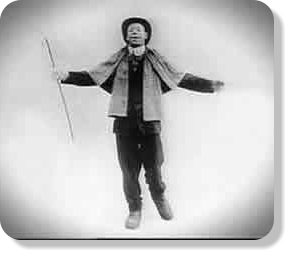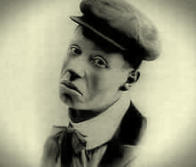

The teenage performer who hit the big time
There are many books and articles covering the Formby story but this page will concentrate on the
much lesser known George Hoy. This was the name George decided to bill himself as, when he first
decided to take to the stage after his father's death in 1921. George at this time would have been
around 16 or 17 years old and had spent most of his life as a apprentice-jockey.
Much is written about George never having ridden a winner but he must have been a reasonable jockey
as he did ride 42 horses into second place.
The reason why George took the name of Hoy when he first started his stage career was because
Hoy was his mother's maiden name and it was also GF's second christian name.
In the Alan Randal/Ray Seaton book "George Formby - An
Autobiography" the authors state that, "When they were
satisfied he was ready, a try-out performance was arranged at
Harrison’s Picture House, in Earlstown, between Wigan and
Warrington. Accepting Harry Lauder’s advice not to follow a
famous name, he was introduced as George Hoy, taking his
mother’s maiden name, by which he was also christened. The
reason for this, as he explained in later years, was that he did
not want to trade on his father’s fame and reputation. Actually,
this was a contradiction, for he was performing his father’s act
and basing his entire repertoire on his father’s songs. If not
trading on his reputation, he was relying on what had gone into
building it. And why not? Even Charlie Chaplin, as a 16-year-
old, had imitated Formby Snr, who twirled a cane in his song,
‘One of the Boys’."
George's first performances on stage were hardly the shape of
things to come!
"There was little or no resemblance between the raw performer
who shuffled nervously on stage with the downcast eyes for his
first debut in Earlstown and the relaxed performer of later
years. His eyes were lowered and almost apologetically he
began his act, scarcely audible beyond the first few rows.
Someone in the audience called, ‘Go on, George, you’re a chip
off the old block!’
It seems that but for his father's high reputation George would
have really struggled but there were some theatre managers
who did take a chance on him purely because of their regard
for George Formby Senior.
J. D. Clarke, manager of the Palace Theatre, Birkenhead
decided initially to give George a week's work, but then he
rewarded him with a contract to appear in his shows over the
next five years. Apparently it was the custom in those days for
a theatre to book a artist for one week, five and even ten years in advance.
"Before he topped the bill at the Palace, Burley, fifteen months later, George Jnr had long ‘rest’ periods,
when he could not get any work. The consensus was ‘All right, but not as good as his father."
In effect, George was really a pale imitation of his more famous father, dressing in his dad's clothes
and making up in his father's image. Listening to father's records and then to George's first efforts,
you would find it hard to tell the difference.
It was only when George picked up a ukulele and then had the good fortune to meet a lady called Beryl,
that his future and his fortune really changed.












The teenage performer who hit
the big time
There are many books and articles covering the
Formby story but this page will concentrate on
the much lesser known George Hoy. This was
the name George decided to bill himself as,
when he first decided to take to the stage after
his father's death in 1921. George at this time
would have been around 16 or 17 years old and
had spent most of his life as a apprentice-
jockey.
Much is written about George never having
ridden a winner but he must have been a
reasonable jockey as he did ride 42 horses into
second place.
The reason why George took the name of Hoy
when he first started his stage career was
because
Hoy was his mother's maiden name and it was
also GF's second christian name.
In the Alan Randal/Ray Seaton book "George
Formby - An Autobiography" the authors state
that, "When they were satisfied he was ready, a
try-out performance was arranged at Harrison’s
Picture House, in Earlstown, between Wigan
and Warrington. Accepting Harry Lauder’s
advice not to follow a famous name, he was
introduced as George Hoy, taking his mother’s
maiden name, by which he was also christened.
The reason for this, as he explained in later
years, was that he did not want to trade on his
father’s fame and reputation. Actually, this was
a contradiction, for he was performing his
father’s act and basing his entire repertoire on
his father’s songs. If not trading on his
reputation, he was relying on what had gone
into building it. And why not? Even Charlie
Chaplin, as a 16-year-old, had imitated Formby
Snr, who twirled a cane in his song, ‘One of the
Boys’."
George's first performances on stage were
hardly the shape of things to come!
"There was little or no resemblance between
the raw performer who shuffled nervously on
stage with the downcast eyes for his first debut
in Earlstown and the relaxed performer of later
years. His eyes were lowered and almost
apologetically he began his act, scarcely audible beyond the first few rows.
Someone in the audience called, ‘Go on, George, you’re a chip off the old
block!’
It seems that but for his father's high reputation George would have really
struggled but there were some theatre managers who did take a chance on
him purely because of their regard for George Formby Senior.
J. D. Clarke, manager of the Palace Theatre, Birkenhead decided initially to
give George a week's work, but then he rewarded him with a contract to
appear in his shows over the next five years. Apparently it was the custom
in those days for a theatre to book a artist for one week, five and even ten
years in advance.
"Before he topped the bill at the
Palace, Burley, fifteen months
later, George Jnr had long ‘rest’
periods, when he could not get
any work. The consensus was ‘All
right, but not as good as his
father."
In effect, George was really a pale
imitation of his more famous
father, dressing in his dad's
clothes
and making up in his father's
image. Listening to father's
records and then to George's first efforts,
you would find it hard to tell the difference.
It was only when George picked up a ukulele and then had the good
fortune to meet a lady called Beryl, that his future and his fortune really
changed.








